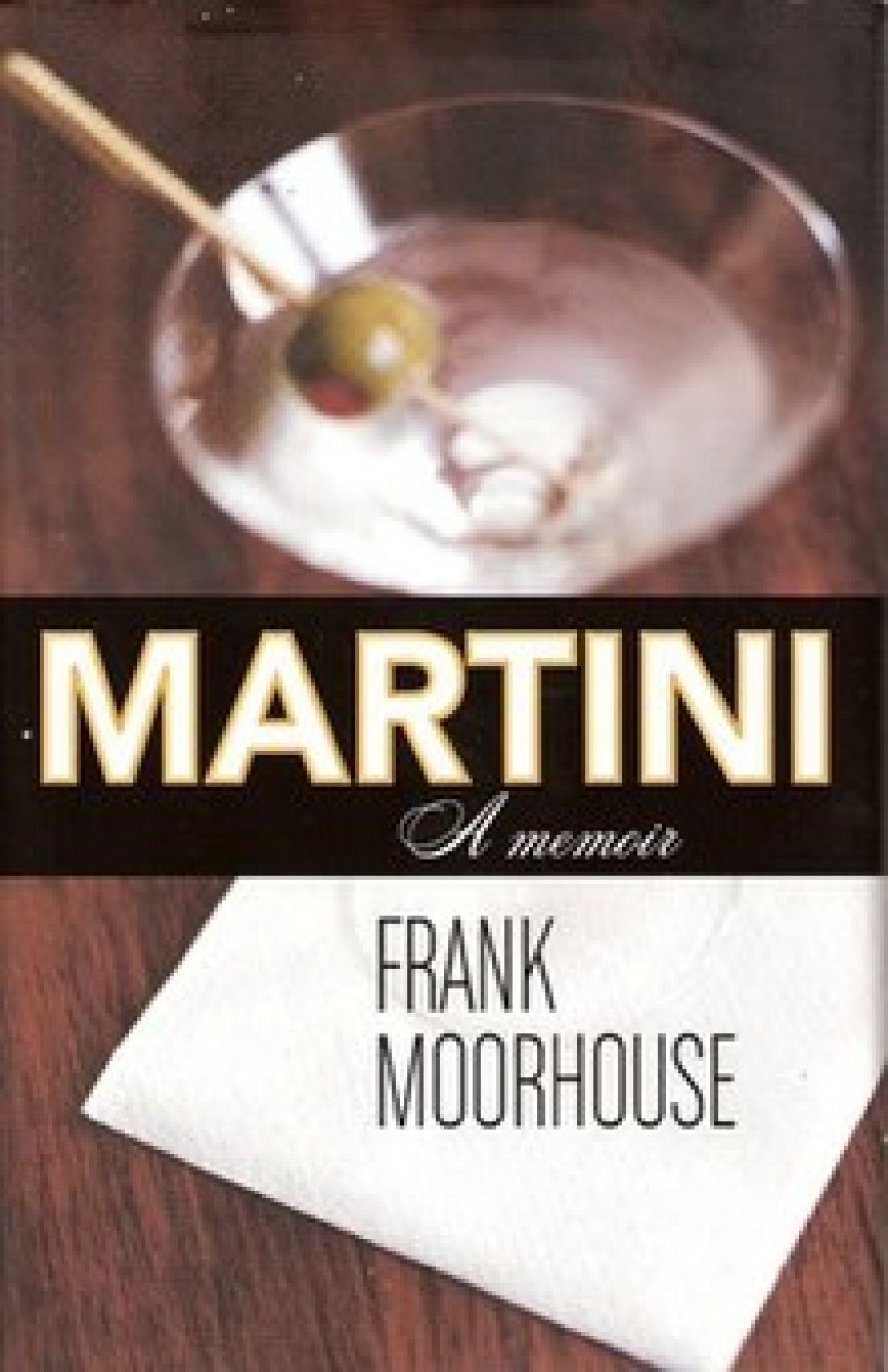
- Free Article: No
- Contents Category: Memoir
- Review Article: Yes
- Article Title: Martini time
- Online Only: No
- Custom Highlight Text:
Australia has become a cocktail country. Those multicoloured, sorbet-like concoctions that young women drink in twilight-lit bars with techno music for a soundtrack. Liquid lollies for the adult-children of our economic prosperity. It has not, however, become a martini country, as Frank Moorhouse might put it. No matter how many little cocktail bars spring up, often without signage, in the backstreets and alleys of our CBDs, few patrons are dedicated to drinking the prince of cocktails. The expensively shabby boys still drink beer, albeit in a glistening-necked bottle with a lemon slice between its lips. For the girls, champers; the various wines for those who don’t like the sickly sorbet liquor.
- Book 1 Title: Martini
- Book 1 Subtitle: A memoir
- Book 1 Biblio: Knopf, $35 pb, 238 pp, 1740513126
- Book 1 Cover Small (400 x 600):

- Book 1 Cover (800 x 1200):

Perfect also if you enjoy considered conversation with one or two similarly drugged others. Moorhouse writes of the bar car in a train as being the ultimate martini bar, ‘with its suggestion of detachment from worldly concern, and with the undefined promise contained within all great train journeys … remote from the self-important busyness around us and from all the clamouring news of the world and all its endeavours, events and claims’. That’s also, of course, what it feels like to drink a martini, especially the second martini of the night. It is like ‘watching the landscape receding rather than approaching’.
The martini is an aesthetic as much as a tasty anaesthetic. Moorhouse, in a chapter titled ‘The Thirteen Awarenesses’, compares the ‘ritual of the martini’ to the Japanese tea-drinking ceremony: preparing it, anticipating it, discussing it, drinking it, or rather sipping it, exactly thirty-two sips per glass, savouring it. A glorification of indulgence? Of course. The passage swoons with flared-nostrilled indulgence. Much of the book does: it’s quite a feat that he can keep the writing up with such pellucid, conversational prose for more than two hundred pages.
Moorhouse is no fool. He knows what lies at the heart of any quiet ritual: ‘a feeling of poignancy at the inevitable passage of time towards death.’ There’s the irony that allows the martini topic to be stretched a long way. It lends an underlying darkening of tone that means that the work isn’t some daffy bit of nonsense, a boozy man’s fantasy. Not many characters pass through Martini. Those who do circulate at the edge of the martini table, in brief correspondence, of the writer’s memory. The drink itself is the main character: how it orders self-reflection, provides a temporary escape from the world. A drinker is then in a suitable frame of mind to give a weak but unworried nod in the shadowy direction of the grim reaper. Says Moorhouse: ‘The martini is both a simple demonstration and a parody of the Platonic dictum that the unexamined life is not worth living.’
This book sets out almost everything about the martini you might care to contemplate: its history, the right olives to use, the best olive sticks, the best martini glasses, even what should be worn – a tuxedo no less, if you’re male. Moorhouse lost me there. I’d feel like a Mason. I was surprised that he didn’t include a section on martini prices down through the years and across cultures. Perhaps he felt that would be in poor taste. Perhaps the idea is to let other people pay.
Moorhouse has had his detractors over the years. A master prose stylist he may be, but some feminists complain about his characterisations – that he doesn’t ‘get’ women, even though his highly acclaimed major novels, Grand Days (1993) and Dark Palace (2000), have a woman as their central character. I’ve heard male readers complain that for them he’s too campy, twee, and snobby. Small-minded patriots have frowned at his internationalism, the lack of Australianness in his work.
Martini will probably play into all their hands. The martini is a symbol of high-life American individualism, not Australian matey conformity. A product of the ‘stylish bars and clubs’ of yesteryear, not the ‘egalitarian public bar’. I guess that’s one reason women have historically, at least in the US and Europe, been attracted to the drink – those egalitarian bars were often hostile to them, by law and attitude.
There’s bound to be the odd accusation. Advice such as ‘Nuts and crisps must never be eaten from the packet but always put into dishes’ will make mockers sneer. Personally, I found these sorts of passages funny, took them as a comedy of manners. Wowsers will doubtless view the book as moral, if not medical, terrorism.


Comments powered by CComment